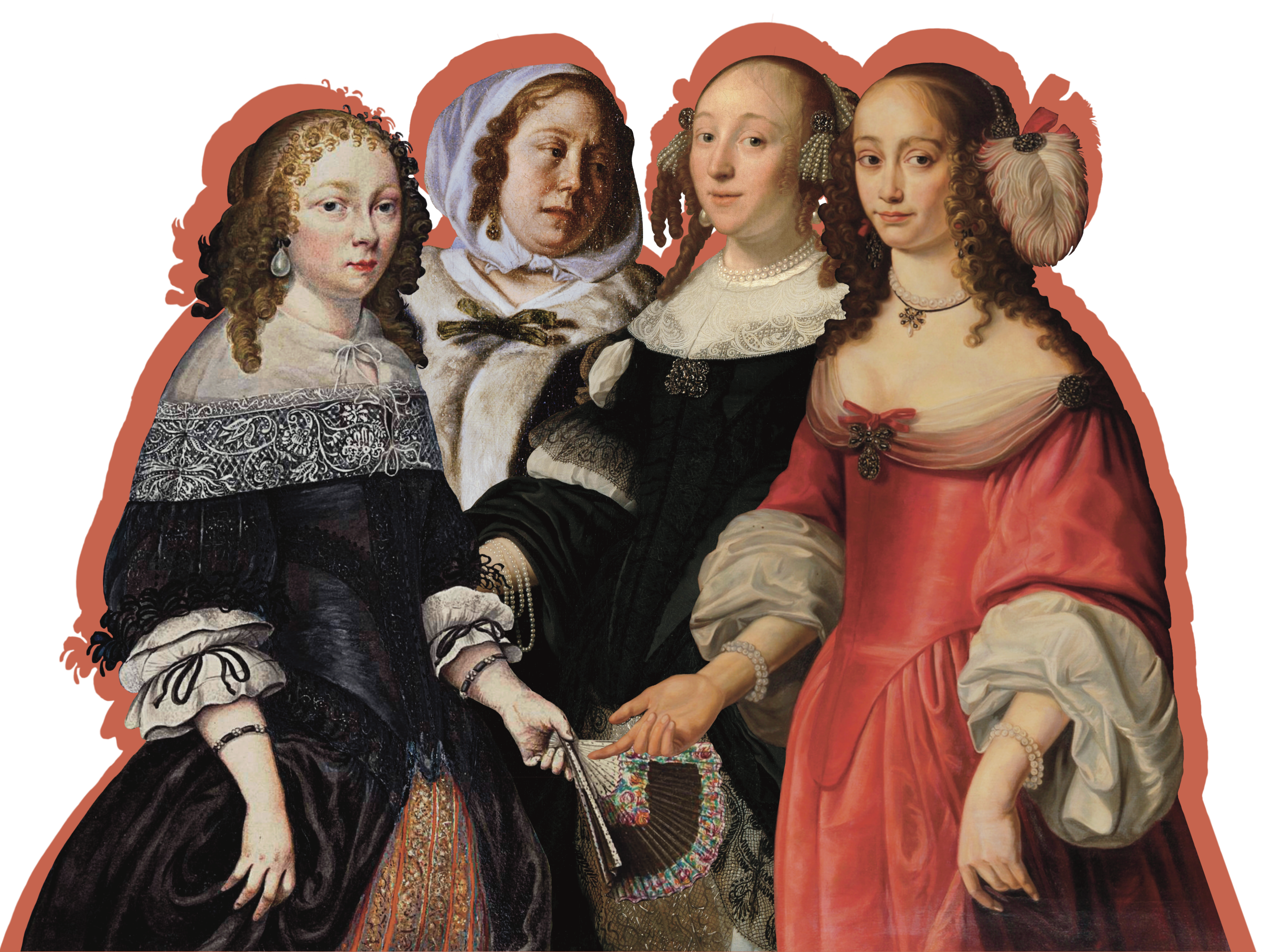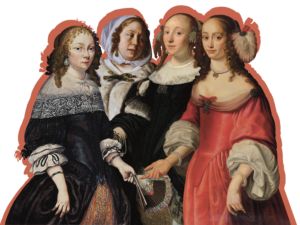Register Now:
The Female Impact Symposium
The 30th of June and the 1st of July 2025, we will gather at the Trippenhuis for a symposium marking the culmination of four years of research by The Female Impact project. This landmark event will showcase new research results, featuring presentations by our project members and distinguished guest speakers. Alongside engaging discussions, we will offer exclusive tours of the historic Trippenhuis, providing a unique backdrop to our findings.

Registration
We warmly invite you to join The Female Impact symposium! Registration is now open and will close on 1 May 2025. Please note that there are a limited number of tickets available, including a maximum of 20 student tickets.
Ticket prices:
- Regular ticket: €175
- Student ticket (BA/MA): €100
Registration is a two-step process:
- Registration Form: Start by filling out this form.
- Payment: Once you have submitted the form, you will receive an email with payment instructions. Your registration is complete only after the payment is finalized.
For any questions or assistance, feel free to contact us at thefemaleimpact@gmail.com.
Program
Below you can find the program for The Female Impact symposium. The full program, including all extended abstracts, is now available for download.
Monday June 30
| 9:00- 9:30 | Doors open and registration |
| 9:30-10:30 | Welcome and lecture, by Judith Noorman |
| 10:30-11:00 | Coffee break |
| 11:00-12:15 | Session 1: The Invisibility Myth of Women in the Archives Bejaarde Dochters (Elderly Daughters) in Haarlem and Leiden and Their Interest in Paintings, 1600-1699 Piet Bakker The Reluctant Patron: Adriana van Beveren and Aelbert Cuyp John Loughman Navigating the Waters of Home and State: Wives, Widows and Art Collecting in the Seventeenth Century Saskia Beranek |
| 12:15-13:15 | Lunch break |
| 13:15-14:45 | Session 2: House(holds) as Space or Place Elizabeth Murray, Peter Lely and Self-Fashioning at Ham House Amy Orrock Antwerp, Alkmaar, Amersfoort and Amsterdam: The Domestic Realm of Alethea Talbot Howard, Countess of Arundel, as Exile in the Low Countries Lucy Chiswell Family First. Preserving Family Heritage in the Late Seventeenth Century Marianne Eekhout The Gendered Dimension of the Alcove Bedchamber: From European Aristocracy to the Dutch Elite Miara Fraikin |
| 14:45-15:15 | Coffee break |
| 15:15-15:45 | PechaKucha Presentations By Maaike Abma, Romy Kerkhof, and Femke Valkhoff |
| 15:45-16:45 | Guided Tours: Explore the Trippenhouse and Its Surroundings |
| 16:45-18:00 | Reception |
Tuesday July 1st
| 9:00-9:30 | Doors open |
| 9:30-10:45 | Session 3: Patron’s Choices Clean Sheets. A Fresh Perspective on Dutch Regentessenstukken Joris Oddens & Anne-Linde Ruiter Ferdinand Bol’s Painted Chamber for Jacoba Lampsins: New Evidence on Iconography, Date, and the Patron’s Intentions Margriet van Eikema Hommes Luxury, Gender, and Display: Pieter Gerritsz van Roestraeten’s Still Lifes as Mirrors of Female Consumption in Late Seventeenth-Century London Sander Karst |
| 10:45-11:15 | Coffee break |
| 11:15-12:30 | Session 4: Female Expertise Power in Their Own Hands: Early Modern Women and the Art of Beauty Erin Griffey Virtuous Time: Women and Their Sewing Boxes as Extensions of Legacy Christine Quach Knowing Through Touch: Women and the Dutch Linen Trade in the Long Seventeenth Century Hannah Prescott |
| 12:30-13:30 | Lunch break |
| 13:30-14:45 | Session 5: Work Dynamics Women in the Art Trade: The Merchant’s Journey of Catharina van den Dorpe Marleen Puyenbroek Maritime Women and the Art Market Irene Jacobs Geertruydt Roghman’s Vrouwtjes: Art, Agency, and Domestic Economy in the Dutch Republic Elizabeth Beattie |
| 14:45-15:15 | Coffee break |
| 15:15-16:30 | Session 6: Fame & Agency A Case Study of the “Afterlife” of a Rediscovered Artist: Judith Leyster Frima Fox Hofrichter Female Agency in the Art of Rembrandt and his Circle Stephanie Dickey Befriending Fortuna, Fashioning Fame Anna Lawrence |
| 16:30-16:45 | Closing Remarks, by Judith Noorman |
| 16:45-18:00 | Reception |
Call for Papers:
The Female Impact Symposium
June 30 and July 1, 2025, The Trippenhuis Building, Amsterdam
Due date: November 22, 2024
Building on the groundbreaking work of the late 1990s and the steady progress in cataloguing the output of women artists, the study of women and gender in 17th-century Dutch art is now flourishing. Women are no longer overlooked; they are now a vital part of conference programs, surveys of Dutch and Flemish art, and museum displays of the Dutch Republic’s artistic heritage. Significant strides have been made in understanding the roles women played in art and how these roles evolved throughout their lifetimes. The study of women and gender is now central to the discourse on Dutch art, broadening and enriching our understanding of art production and consumption in this period. Consequently, our view of the art production and consumption of the time, as well as its academic study have become more inclusive, nuanced, and vibrant. Women were, and always have been, everywhere. This raises the question: where to from here?
This symposium aims to collectively assess the current state of scholarship, comparing research findings across cultures, countries, and disciplines. We seek to deepen our understanding of the implications of recent research and chart new avenues for further study.
The symposium coincides with the culmination of The Female Impact research project, led by Judith Noorman, which will conclude in the summer of 2025. This project contributes to the growing body of scholarship by demonstrating that women influenced all facets and stages of art production and consumption in the Northern Netherlands. Beyond creating art, women managed sales within client networks, oversaw workshop productivity, and handled financial and legal matters. Women also traded in art, sold artists’ materials, and contributed to the family economy in myriad ways they found both profitable and fulfilling. On the buyer’s side, both newly discovered and previously known documents prove that women, aristocratic and non-aristocratic alike, selected art and artists, judged commissioned works, negotiated prices, had paintings repaired, and bequeathed them to future generations. Women also oversaw building projects, demonstrating their influence beyond art collection alone. Together, our research reexamines the household as a site of agency, power, and self-actualization—both in the art market and beyond. By looking at these overlooked dynamics, we have uncovered insights that apply equally to men’s roles in art production and consumption in the Dutch Republic.
In addition to sharing our findings, we invite paper proposals that explore women, gender, and art production and consumption within and beyond the Northern Netherlands during the Early Modern period. Topics may include, but are not limited to: art and household management, patronage and the art market, family economies and collaborations, examples of women leveraging the domestic sphere, women’s artistic strategies, artistic approaches tailored to a female audience, the relationship between artworks and other (luxury) household goods, the domestic realm as a space for self-fashioning, and depictions by and for women. We encourage collective and comparative approaches, and as always, welcome new case studies.
Our venue, The Trippenhuis Building, offers a fitting backdrop for these discussions. Famously built for Louis and Hendrick Trip, brothers who amassed their fortune through arms dealing, artillery, and other military supplies, the Trippenhuis is a monumental testament to traditional male power. As such, this house, and its interior, poses a challenge to the long-held belief that the domestic realm was exclusively a woman’s domain. Does the building and its decoration complicate research based on that assumption, or did the women of the Trippenhuis leave their own indelible marks—and if so, how? Participants will have exclusive access to the building, which is typically closed to the public, to explore these questions firsthand.
Papers presented at the symposium will be considered for publication in an edited volume organized by The Female Impact.
Please submit a proposal (250-500 words) and a CV (including your name and institutional affiliation) by November 22, 2024, to: thefemaleimpact@gmail.com. Applicants will be notified by mid-December, and the program will be published before Christmas, with registration opening soon after.
Please note that all speakers will be required to register for the symposium. The registration fee is expected to be between 150 and 175 euros. A reduced fee will be available for students.
Stay up to date by signing up for our newsletter.
